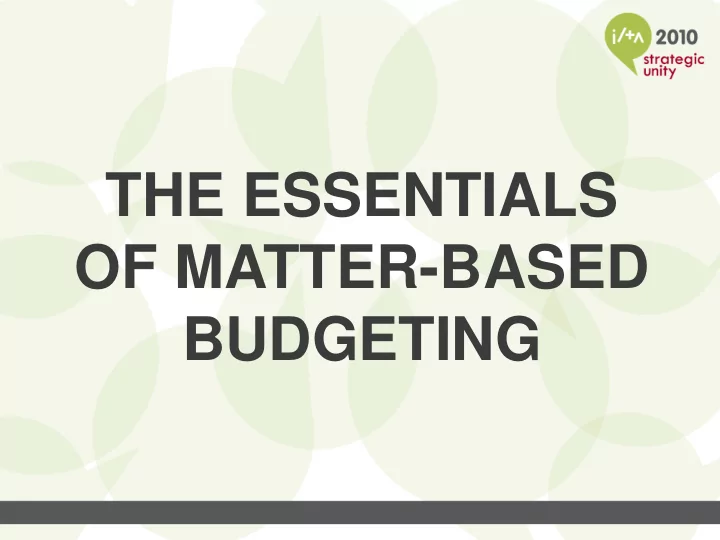

THE ESSENTIALS OF MATTER-BASED BUDGETING
Keith Lipman William F. Auther President, Prosperoware Partner, Bowman and Brooke LLP • Former Director of Legal Solutions • Experienced Trial Lawyer in at Autonomy, Interwoven and Business Disputes and Product iManage Liability • Currently consults on matter • Has been budgeting matters for managements and LPM using a over 20 years variety of tools Randy Steere Doug Brown Owner, Randy Steere LLC President, Basal Enterprises Inc. • Consults on matter-based • Spent 14 years consulting on matter budgeting using Aderant Aderant and billing management for Elite or Elite • Currently consults on financial and • Developed BudgetManager and practice management area of the PrebillManager software to assist legal environment law firms with effective budget management
Regardless of how a matter is billed, whether hourly or as an Alternative Fee Arrangement (AFA), matters should have budgets. This session will outline the essential elements required to develop a matter-based budget and how to track progress against it. Attendees will examine how effective budgeting improves communication with clients and management of the assigned legal team.
Initial Communication Between Lawyer and Client • Request for a budget – What do you need to know – Accounting/finance department • Initial budget planning
Initial Communication Between Lawyer and Client • Important Information: – What is the client’s viewpoint or perspective? – What are the client’s expectations? – What is the scope of the work? – What is the amount in controversy? – How difficult does the client expect the project to be? • Client’s responses can lead to other questions
Initial Communication Between Lawyer and Firm • What tools are available to assist the attorney? – AFAs – Practice management business tools – Cost • Data mining
Initial Communication Between Lawyer and Firm • Important Information: – What are billing/reporting parameters? – Will the budget be based on a person and a task or just a person? – Are there any applicable task codes? – What type and format of information is client expecting? – How do you mine data to determine: • Profitability • What is needed to make it profitable • Whether the firm even wants to do the work • What other questions should the attorney ask of the client?
Budgeting Issues For Law Firm Once Retained • What does the firm do with the proposed budget once their services are retained? • Managing the budget and project • Tracking performance
Budgeting Issues For Law Firm Once Retained • Key Points: – Should the firm employ legal project management tools? If so: • How? • Which ones? – Using Phase Task codes • For eBilling and budgeting – ABA – Firm-developed: Does firm map codes to ABA task codes? – Client specified
Client Reporting Requirements • Expectations • Tracking expenses • Budgeting Requirements
Client Reporting Requirements • What are the client’s rules and expectations regarding the use of phase task codes – For eBilling and budgeting • ABA • Firm-developed • Client specified
Going Forward: How to Use Performance Based Data • Post mortem analysis of a budget • What type of work is suitable for matter-based budgeting? • How do you prepare the law firm for matter- based budgeting?
Going Forward: Things To Consider For Budgeting Future Matters • Identify prior budgets for the same type of work • Analysis of profitability of the work • Analysis of the rate/fee structure for the work • Staffing levels/needs for prior budgeted work • Databases for budget profiling
Conclusion and Questions
Recommend
More recommend